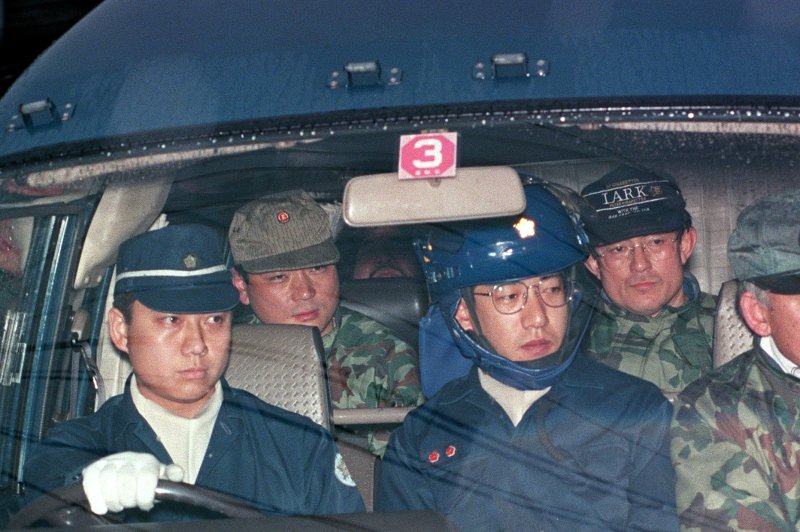A file photo taken in June 1995 shows Aum Shinrikyo founder Chizuo Matsumoto, known as Shoko Asahara (C, back), being escorted by police to the Tokyo Metropolitan Police Department. The doomsday cult leader was executed earlier this month along with six other cult leaders. On Thursday the remaining six cult members convicted of the crime were hanged. Photo by JiJi Press/EPA-EFE
July 26 (UPI) -- The six remaining Aum Shinrikyo cult members on death row were executed Thursday, the last of the 13 Japanese cult members to be hanged in the past three weeks.
The six were convicted in a 1995 sarin nerve gas attack on the Tokyo subway system that killed 12 people and injured hundreds. They were also convicted of committing a sarin attack in Matsumoto, Nagano Prefecture, in 1994, and for killing a lawyer, his wife and their baby son in 1989.
"I ordered the executions after giving it careful repeated consideration," Justice Minister Yoko Kamikawa said. "The suffering of the victims, bereaved families and those who survived are unimaginable."
Chizuo Matsumoto, the mastermind of the attack on Tokyo's subway system, was hung earlier this month along with six former senior members of the cult.
Matsumoto, known as Shoko Asahara, was the founder of the Aum Shinrikyo cult. In addition to the Tokyo subway attack, he was found guilty of 13 other crimes and accused in the deaths of 27 people.
Japanese security officials are monitoring Aum's successor organizations -- Aleph and two splinter groups.
Hisashi Mizukami, who lives near the main office of Aleph in Tokyo, said the hangings are an end to an era but not an end to worry.
"Tor local residents, [their worries] won't end unless [successor groups] are disbanded," Hisashi said.
The executions drew criticism from activists who oppose the death penalty.
Hiroka Shoji, East Asia researcher at Amnesty International, said "taking of a life in retribution is never the answer" and does not leave Japanese society any safer.
"The hangings fail to address why people were drawn to a charismatic guru with dangerous ideas," Hiroka said. "The taking of a life in retribution is never the answer. It is high time for the Japanese authorities to establish an immediate moratorium on all executions and promote an informed debate on the death penalty as first steps towards its abolition."
Kamikawa, the Japanese justice minister, defended the hangings and said during a news conference the majority of the public believes there is "no other option than to execute those who have committed brutal crimes."















